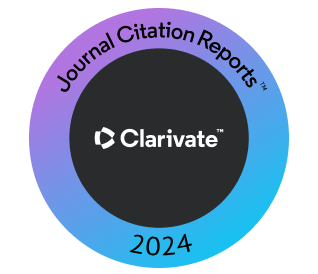The Local Anesthetic Activity of Lavandula angustifolia and Eugenia caryophyllata Essential Oils
DOI:
https://doi.org/10.14500/aro.11426Keywords:
Clove oil, Corneal reflex, Eugenia caryophyllata, Lavandula angustifolia, Lavender oil, Lidocaine, Local anesthesiaAbstract
Previous studies show that Lavandula angustifolia (lavender) and Eugenia caryophyllata (clove) essential oils can help relieve dental pain. Clove oil and lavender oil were tested as topical anesthetics in this study on rabbits, and their effects and likely mechanisms of action were analyzed. Clove oil and lavender oil were extracted by hydrodistillation using a Clevenger-setup apparatus. Topically applying lidocaine, clove oil, or lavender oil topically all significantly reduced corneal sensitivity. The sensitivity of the cornea was successfully reduced by treatments consisting of lidocaine at a concentration of 0.5%, 25 μg of clove oil, and 50 μg of lavender oil. When clove oil is applied topically to the cornea, it produces effects similar to those of a local anesthetic due to the involvement of the cholinergic system. To achieve the desired effect of producing local anesthesia in the cornea of the rabbit, lidocaine, clove oil, and lavender oil were applied topically to the animal. A noticeable local anesthetic effect was produced when sub-anesthetic doses of lidocaine were combined with sub-anesthetic doses of lavender or clove oil.Downloads
References
Ahmed, S.A., Altaei, T., and Ahmed, T., 2020. Comparative study of the antioxidant effects of lavender and flax oils in recurrent aphthous ulceration treatment. Journal of Baghdad College of Dentistry, 32(1), pp.1-9. DOI: https://doi.org/10.26477/jbcd.v32i1.2757
Ait Said, L., Zahlane, K., Ghalbane, I., El Messoussi, S., Romane, A., Cavaleiro, C., and Salgueiro, L., 2015. Chemical composition and antibacterial activity of Lavandula coronopifolia essential oil against antibiotic-resistant bacteria. Natural Product Research, 29(6), pp.582-585. DOI: https://doi.org/10.1080/14786419.2014.954246
Ali, O.Y, Rozhan, A., and Subasini, U., 2023. SYBR-Green I fluorescence-based qRT-PCR of clove oil’s anticancer, chemical characterization and antidiabetic activities. Journal of Population Therapeutics and Clinical Pharmacology, 30(11), pp.125-134. DOI: https://doi.org/10.47750/jptcp.2023.30.11.015
Arung, E.T., Matsubara, E., Kusuma, I.W., Sukaton, E., Shimizu, K., and Kondo, R., 2011. Inhibitory components from the buds of clove (Syzygium aromaticum) on melanin formation in B16 melanoma cells. Fitoterapia, 82, pp.198-202. DOI: https://doi.org/10.1016/j.fitote.2010.09.008
Bates, B., Mitchell, K., Keller, J.M., Chan, C., Swaim, W.D., Yaskovich, R., Mannes, A.J., and Iadarola, M.J., 2010. Prolonged analgesic response of cornea to topical resiniferatoxin, a potent TRPV1 agonist. Pain, 149, pp.522-528. DOI: https://doi.org/10.1016/j.pain.2010.03.024
Batiha, G.E.S., Teibo, J.O., Wasef, L., Shaheen, H.M., Akomolafe, A.P., Teibo, T.K.A., Al-Kuraishy, H.M. Al-Garbeeb, A.I., Alexiou, A., and Papadakis, M. 2023. A review of the bioactive components and pharmacological properties of Lavandula species. Naunyn Schmiedebergs Arch Pharmacol, 396(5), pp.877-900. DOI: https://doi.org/10.1007/s00210-023-02392-x
Bikmoradi, A., Khaleghverdi, M., Seddighi, I., Moradkhani, S., Soltanian, A., and Cheraghi, F., 2017. Effect of inhalation aromatherapy with lavender essence on pain associated with intravenous catheter insertion in preschool children: A quasi-experimental study. Complementary Therapies in Clinical Practice, 28, pp.85-91. DOI: https://doi.org/10.1016/j.ctcp.2017.05.008
Chaieb, K., Hajlaoui, H., Zmanta, T., Kahla-Nakbi, A.B., Mahmoud, R., Mahdouani, K., and Bakhrouf, A., 2007. The chemical composition and biological activity of clove essential oil, Eugenia caryophyllata (Syzigium aromaticum L. Myrtaceae): A short review. Phytotherapy Research, 21, pp.501-506. DOI: https://doi.org/10.1002/ptr.2124
Chioca, L.R., Ferro, M.M., Baretta, I.P., Oliveira, S.M., Silva, C.R., Ferreira, J., Losso, E.M., and Andreatini, R., 2013. Anxiolytic-like effect of lavender essential oil inhalation in mice: Participation of serotonergic but not GABAA/benzodiazepine neurotransmission. Journal of Ethnopharmacology, 147(2), pp.412-418. DOI: https://doi.org/10.1016/j.jep.2013.03.028
Chung, G., Im, S.T., Kim, Y.H., Jung, S.J., Rhyu, M.R., and Oh, S.B., 2014. Activation of transient receptor potential ankyrin 1 by eugenol. Neuroscience, 261, pp.153-160. DOI: https://doi.org/10.1016/j.neuroscience.2013.12.047
Dalai, M.K., Bhadra, S., Chaudhary, S.K., Bandyopadhyay, A., and Mukherjee, P.K., 2014. Anti-cholinesterase activity of the standardized extract of Syzygium aromaticum L. Pharmacognosy Magazine, 10, pp.S276-S282. DOI: https://doi.org/10.4103/0973-1296.133275
Daniel, A.N., Sartoretto, S.M., Schmidt, G., Caparroz-Assef, S.M., Bersani-Amado, C.A., and Cuman, R.K.N., 2009. Anti- inflammatory and antinociceptive activities A of eugenol essential oil in experimental animal models. Revista Brasileira de Farmacognosia, 19, pp.212-217. DOI: https://doi.org/10.1590/S0102-695X2009000200006
De Rapper, S., Viljoen, A., and Vuuren, S., 2016. The in vitro antimicrobial effects of Lavandula angustifolia essential oil in combination with conventional antimicrobial agents. Evidence-Based Complementary and Alternative Medicine, 2016, p.2752739. DOI: https://doi.org/10.1155/2016/2752739
Dohi, S., Terasaki, M., and Makino, M., 2009. Acetylcholinesterase inhibitory activity and chemical composition of commercial essential oils. Journal of Agricultural and Food Chemistry, 57, pp.4313-4318. DOI: https://doi.org/10.1021/jf804013j
Farazifard, R., Safapour, F., Sheibani, V., and Javan, M., 2005. Eye wiping test: A sensitive animal model for acute trigeminal pain studies. Brain Research Protocols, 16, pp.44-49. DOI: https://doi.org/10.1016/j.brainresprot.2005.10.003
Gülçin, I., Elmastas, M., and Aboul-Enein, H.Y., 2012. Antioxidant activity of clove oil - a powerful antioxidant source. Arabian Journal of Chemistry, 5, pp.489-499. DOI: https://doi.org/10.1016/j.arabjc.2010.09.016
Hirata, H., and Meng, I.D., 2010. Cold-sensitive corneal afferents respond to a variety of ocular stimuli central to tear production: implications for dry eye disease. Investigative Ophthalmology and Visual Science, 5, pp.3969-3976. DOI: https://doi.org/10.1167/iovs.09-4744
Jianu, C., Pop, G., and Gruia, A., 2013. Chemical composition and antimicrobial activity of essential oils of lavender (Lavandula angustifolia) and lavandin (Lavandula x intermedia) grown in Western Romania. International Journal of Agriculture and Biology, 6(4), pp.15-17.
Kajjari, S., Joshi, R.S., and Hugar, S.M., 2022. The effects of lavender essential oil and its clinical implications in dentistry: A review. International Journal of Clinical Pediatric Dentistry, 15(3), pp.385-388. DOI: https://doi.org/10.5005/jp-journals-10005-2378
Khalilzadeh, E., Hazrati, R., and Vafaei Sayah, G., 2014. Evaluation of chemical composition, anti-inflammatory and anti-nociceptive effects of Eugenia caryophyllata buds’ essential oil. Journal of Herbal Drugs, 5, pp.68-76.
Kim, J., Kim, N.S., Lee, K.C., Lee, H.B., Kim, M.S., and Kim, H.S., 2013. Effect of topical anesthesia on evaluation of corneal sensitivity and intraocular pressure in rats and dogs. Veterinary Ophthalmology, 16, pp.43-46. DOI: https://doi.org/10.1111/j.1463-5224.2012.01020.x
Koulivand, P.H., Khaleghi Ghadiri, M., and Gorji, A., 2013. Lavender and the nervous system. Evidence-Based Complementary and Alternative Medicine, 36, pp.235-238. DOI: https://doi.org/10.1155/2013/681304
Kritsidima, M., Newton, T., and Asimakopoulou, K., 2010. The effects of lavender scent on dental patient anxiety levels: A cluster randomized controlled trial. Community Dentistry and Oral Epidemiology, 38(1), pp.83-87. DOI: https://doi.org/10.1111/j.1600-0528.2009.00511.x
Leffler, A., Fischer, M.J., Rehner, D., Kienel, S., Kistner, K., Sauer, S.K., Gavva, N.R., Reeh, P.W., and Nau, C., 2008. The vanilloid receptor TRPV 1 is activated and sensitized by local anesthetics in rodent sensory neurons. Journal of Clinical Investigation, 118, pp.763-776. DOI: https://doi.org/10.1172/JCI32751
Lionnet, L., Beaudry, F., and Vachon, P., 2010. Intrathecal eugenol administration alleviates neuropathic pain in male Sprague-Dawley rats. Phytotherapy Research, 24, pp.1645-1653. DOI: https://doi.org/10.1002/ptr.3174
Miranda, H.F., Sierralta, F., and Prieto, J.C., 2009. Synergism between NSAIDs in the orofacial formalin test in mice. Pharmacology Biochemistry and Behavior, 92, pp.314-318. DOI: https://doi.org/10.1016/j.pbb.2008.12.018
Nardarajah, D., Dhanraj, M., and Jain, A.R., 2018. Effects of lavender aromatherapy on anxiety levels of patients undergoing mandibular third molar extraction. Drug Invention Today, 10(7), pp.1318-1322.
Pan, Z., Wang, Z., Yang, H., Zhang, F., and Reinach, P.S., 2011. TRPV1 activation is required for hypertonicity stimulated inflammatory cytokine release in human corneal epithelial cells. Investigative Ophthalmology and Visual Science, 52, pp.485-493. DOI: https://doi.org/10.1167/iovs.10-5801
Park, C.K., Kim, K., Jung, S.J., Kim, M.J., Ahn, D.K., Hong, S.D., Kim, J.S., and Oh, S.B., 2009. Molecular mechanism for local anesthetic action of eugenol in the rat trigeminal system. Pain, 144, pp.84-94. DOI: https://doi.org/10.1016/j.pain.2009.03.016
Park, C.K., Li, H.Y., Yeon, K.Y., Jung, S.J., Choi, S.Y., Lee, S.J., Lee, S., Park, K., Kim, J.S., and Oh, S.B., 2006. Eugenol inhibits sodium currents in dental afferent neurons. Journal of Dental Research, 85, pp.900-904. DOI: https://doi.org/10.1177/154405910608501005
Park, S.H., Sim, Y.B., Lee, J.K., Kim, S.M., Kang, Y.J., Jung, J.S., and Suh, H.W., 2011. The analgesic effects and mechanisms of orally administered eugenol. Archives of Pharmacal Research, 34, pp.501-507. DOI: https://doi.org/10.1007/s12272-011-0320-z
Pathan, J.M., Dadpe, M.V., Kale, Y.J., Dahake, P.T., and Kendre, S.B., 2020. Evaluation of lavender oil as a topical analgesic agent before dental anaesthesia through pain rating scales-an in vivo study. IOSR Journal of Dental and Medical Sciences, 19(7), pp.6-13.
Pinto, E., Vale-Silva, L., Cavaleiro, C., and Salgueiro, L., 2009. Antifungal activity of the clove essential oil from Syzygium aromaticum on Candida, Aspergillus and dermatophyte species. Journal of Medical Microbiology, 58, pp.1454-1462. DOI: https://doi.org/10.1099/jmm.0.010538-0
Properzi, A., Angelina, P., Bertuzzi, G., and Venanzoni, R., 2013. Some biological activities of essential oils. Medicinal and Aromatic Plants, 2(5), p.000136.
Prusinowska, R., and Śmigielski, K.B., 2014. Composition, biological properties and therapeutic effects of lavender (Lavandula angustifolia L). A review. Herbapolonica, 60, pp.56-66. DOI: https://doi.org/10.2478/hepo-2014-0010
Rosenthal, P., Baran, I., and Jacobs, D.S., 2009. Corneal pain without stain: Is it real? The Ocular Surface, 7, pp.28-40. DOI: https://doi.org/10.1016/S1542-0124(12)70290-2
Shaw, D., Annett, J.M., Doherty, B., and Leslie, J.C., 2007. Anxiolytic effects of lavender oil inhalation on open-field behaviour in rats. Phytomedicine, 14(9), pp.613-620. DOI: https://doi.org/10.1016/j.phymed.2007.03.007
Silva, G.L., Luft, C., Lunardelli, A., Amaral, R.H., da Silva Melo, D.A., Donadio, M.V.F., Nunes, F.B., de Azambuja, M.S., Santana, J.C., Moraes, C.M.B., Mello, R.O., Cassel, E., de Almeida Pereira, M.A., and de Oliveira, J.R., 2015. Antioxidant, analgesic and anti-inflammatory effects of lavender essential oil. Anais da Academia Brasileira de Ciências, 87(2 Suppl), pp.1397-1408. DOI: https://doi.org/10.1590/0001-3765201520150056
Simpson, M.G., 2019. Plant Systematics. Academic press, United States.Tamaddonfard, E., Khalilzadeh, E., Hamzeh-Gooshchi, N., and Seiednejhad-Yamchi, S., 2008. Central effect of histamine in a rat model of acute trigeminal pain. Pharmacological Reports, 60, pp.219-224.
Tschiggerl, C., and Bucar, F., 2010. Volatile fraction of lavender and bitter fennel infusion extracts. Natural Product Communications, 5(9), pp.1431-1436. DOI: https://doi.org/10.1177/1934578X1000500917
Uthirapathy, S., 2023. “Cytostatic effects of avocado oil using single-cell gel electrophoresis (Comet Assay): An evaluation. ARO-The Scientific Journal of Koya University, 11(1), pp.16-21. DOI: https://doi.org/10.14500/aro.11073
Uthirapathy, S., and Tahir, T.F., 2021. “Withania somnifera: Correlation of phytoconstituents with hypolipidemic and cardioprotective activities. ARO-The Scientific Journal of Koya University, 9(2), pp.15-21. DOI: https://doi.org/10.14500/aro.10844
Wilson, T.M., Poulson, A., Packer, C., Carlson, R.E., and Buch, R.M., 2021. Essential oil profile and yield of corolla, calyx, leaf, and whole flowering top of cultivated Lavandula angustifolia Mill. (Lamiaceae) from Utah. Molecules, 26(8), p.2343. DOI: https://doi.org/10.3390/molecules26082343
Zagon, I.S., Sassani, G.W., Immonen, J.A., and McLaughlin, P.J., 2014. Ocular surface abnormalities related to type 2 diabetes are reversed by the opioid antagonist naltrexone. Clinical and Experimental Ophthalmology, 42, pp.159-168. DOI: https://doi.org/10.1111/ceo.12144
Zheljazkov, V.D., Cantrell, C.L., Astatkie, T., and Jeliazkova, E., 2013. Distillation time effect on lavender essential oil yield and composition. Journal of Oleo Science, 62(4), pp.195-199. DOI: https://doi.org/10.5650/jos.62.195
Downloads
Published
How to Cite
Issue
Section
License
Authors who choose to publish their work with Aro agree to the following terms:
-
Authors retain the copyright to their work and grant the journal the right of first publication. The work is simultaneously licensed under a Creative Commons Attribution License [CC BY-NC-SA 4.0]. This license allows others to share the work with an acknowledgement of the work's authorship and initial publication in this journal.
-
Authors have the freedom to enter into separate agreements for the non-exclusive distribution of the journal's published version of the work. This includes options such as posting it to an institutional repository or publishing it in a book, as long as proper acknowledgement is given to its initial publication in this journal.
-
Authors are encouraged to share and post their work online, including in institutional repositories or on their personal websites, both prior to and during the submission process. This practice can lead to productive exchanges and increase the visibility and citation of the published work.
By agreeing to these terms, authors acknowledge the importance of open access and the benefits it brings to the scholarly community.
Accepted 2023-10-28
Published 2023-11-10
















 ARO Journal is a scientific, peer-reviewed, periodical, and diamond OAJ that has no APC or ASC.
ARO Journal is a scientific, peer-reviewed, periodical, and diamond OAJ that has no APC or ASC.